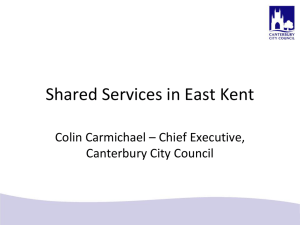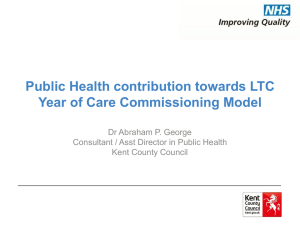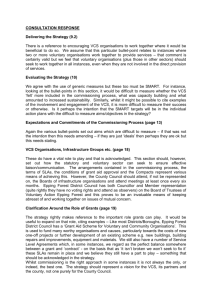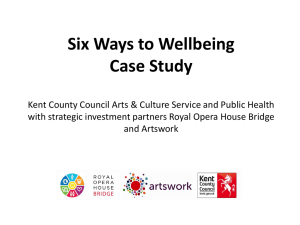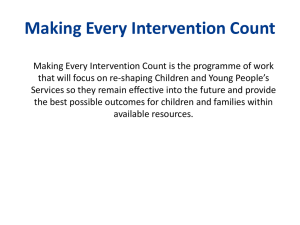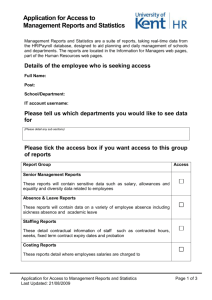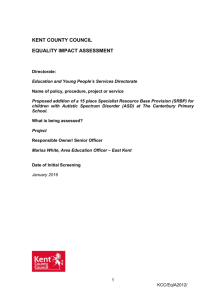Draft Voluntary and Community Sector Policy
advertisement
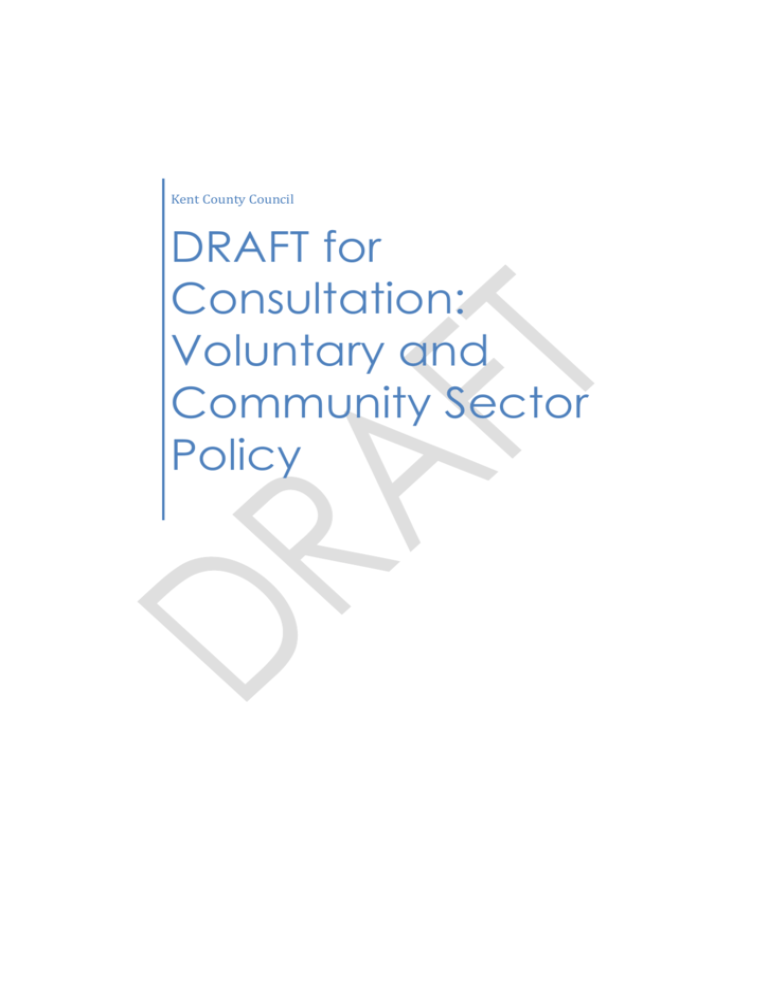
Kent County Council DRAFT for Consultation: Voluntary and Community Sector Policy DRAFT Introduction Kent County Council (KCC) is an organisation in transition, with an unparalleled degree of change taking place across the authority. This policy is intended to offer some clarity amongst all this change and set out our future relationship with the Voluntary and Community Sector (VCS) in Kent. We recognise that the VCS in Kent is diverse and does not simply exist to provide services on behalf of the Council. Its role is deeply embedded in the heart of civil society in Kent and we recognise that the majority of organisations within the VCS have no direct relationship with the state; nationally only a quarter of voluntary organisations have a direct relationship1. Our future relationship with the sector will therefore, encompass the sectors role as both a provider of services and its wider role in supporting individuals and communities in Kent. These roles are of equal importance to us and we want to ensure that the sector is sustainable in the future and can continue to flourish; a healthy VCS is at the heart of a vibrant civil society in Kent. Our support to the sector both financial and non-financial will therefore reflect this diversity. We will support the sector to achieve its aims and objectives as we recognise this is good for the communities and people of Kent and builds resilience in our communities. We will also support the sector so that it can successfully compete in an increasingly competitive market of public service delivery. As set out in Facing the Challenge, KCC is moving to become a strategic commissioning authority. This does not mean we are outsourcing all services but that we are committed to commissioning as an approach. However we acknowledge that commissioning may feel very different to some of our local providers such as the VCS and we will need to support them to adapt to this change. Our grant funding framework brings this policy together, providing a bridge between the different parts of the sector. We hope the framework will ensure that our grant funding is accessible to a range of organisations and affirms our commitment to grants within a commissioning approach. The KCC VCS policy is therefore a key document for the authority reflecting the crucial part the sector plays in achieving strong and resilient communities and in supporting KCC to achieve its outcomes for the residents of Kent. Principles underpinning this policy 1. 1 Recognition of the contribution of the VCS in Kent, not only those that provide services on our behalf but also the vital role they play in building capacity and resilience within our communities NCVO The UK Civil Society Almanac 2014 1 2. Our grant funding is accessible to organisations across the sector supporting innovation and projects, that help us to deliver our strategic outcomes 3. Our grant process is clear and transparent which allows us to monitor the impact of our funding and the innovation within the sector 4. The VCS in Kent is supported to be sustainable and not overly dependent on local authority funding 5. To build the capacity of the sector to support KCC to achieve the outcomes it wants for the residents of Kent 6. To safeguard sector independence How will the Policy be used? To provide a framework to guide the Council’s engagement and relationship with the VCS. To underpin KCC’s engagement with the sector To provide consistency in our approach to funding the VCS particularly in relation to grants To clarify our offer of support to the sector To strengthen and widen KCC’s engagement with the sector To enhance our commitment to volunteering Background: National Context This policy is set within the context of unprecedented financial challenge and a dramatically changing public sector landscape. This has seen a shift in relationship between the VCS and statutory bodies and a changing funding environment. Whilst the valuable role the sector plays continues to be held in high regard, the sector has had to contend with a reduction in its overall income. This is not wholly surprising given the financial pressures being felt across the board. Between 2010/11 and 2011/12, total income from government to voluntary sector organisations fell by £1.3 billion in real terms. The sector’s income from grants nationally has fallen considerably in recent years, with 80% of government funding to charities now received through contracts for delivering services rather than grants to support their work2. However individuals still remain the sector’s main source of income. For smaller organisations this is particularly true as they receive very little statutory funding, relying on individual donations and fundraising. This is not however intended to be a tale of woe; as public sector funding is increasingly under strain the sector has been responding to these challenges by diversifying and re-evaluating the support it needs to adapt to its new environment. For some organisations this has meant exploring social investment as an alternative funding stream, for others they have rebooted their fundraising strategies and indeed a proportion of the sector have 2 http://data.ncvo.org.uk/a/almanac14/overview-2/ 2 developed their business model and successfully entered the competitive market. What is clear is that this has been a time of great change and reflection for the sector and it is this backdrop, which has driven the development of KCC’s VCS policy. Local Context: There are approximately 4,622 registered charities active in Kent, of which, 3,647 operate at a local level3. 43% of these charities have an income under £10K. In 2013/14 KCC’s total spend with Kent based VCS organisations for the provision of services was £123m. Whilst KCC is a significant funder of the VCS in Kent alongside statutory partners, its contribution to the sectors income as a whole should not be overestimated. The sector brings in significant investment to Kent; research by NCVO and Big Society Web found that the 3142 charities in Kent4 have an income of £383.9m5. We should also not underestimate the sector as a significant employer, as well as the significant social and economic value of the many volunteers who provide the backbone to a range of VCS organisations. In 2012/13 the largest charities in Kent (those with an income greater than £500.000) employed 6489 staff (FTE)6. In the same year these charities also had 11,386 volunteers within their organisations7. Legislative framework: KCC values the unique contribution of the sector in Kent and is committed to supporting its growth and sustainability. The Best Value Duty sets out reasonable expectations of the way authorities should work with the VCS and small businesses when facing difficult funding decisions but is intended to be flexible. However, there are two primary pieces of legislation which give the local authority power to fund the VCS: 1. The Health services and Public Health Act 1968 provides a legal framework for the local authority to give grants to the VCS where it is providing services which the Local Authority has a statutory duty to provide. “A local authority may give assistance by way of grant or by way of loan, or partly in the one way and partly in the other, to a voluntary organisation 3 NCVO and Big Society Data based on UK Civil Society Almanac definitions http://data.ncvovol.org.uk/areas/kent 4 This is based on the "general charities" definition. This definition takes all registered charities as a base, but excludes certain categories of charity to produce a tighter definition. The general charities definition excludes independent schools, faith charities, those controlled by government and others. 5 This total income figure is based on the latest income of charities in the population, so does not reflect the total income in one financial year http://data.ncvo-vol.org.uk/areas/kent/income 6 http://data.ncvo-vol.org.uk/areas/kent/workforce Figures based on 103 charities who returned data 7 http://data.ncvo-vol.org.uk/areas/kent/workforce. Charities are not required to record this, and measurement can be inconsistent, results should be treated with caution. Only 65 charities returned data on volunteers. 3 whose activities consist in, or include, the provision of a service similar to a relevant service, the promotion of the provision of a relevant service or a similar one, the publicising of a relevant service or a similar one or the giving of advice with respect to the manner in which a relevant service or a similar one can best be provided” (Section 65). 2. Section 2 of the Local Government Act 2000 gives the local authority the power to give support to organisation(s) which promote the economic, environmental and social wellbeing of their area, which includes incurring expenditure. Social Value We recognise the inherent social value of the VCS, not simply in terms of commissioning services but also the sectors contribution to the social, economic and environmental wellbeing of Kent. Social Value is therefore not simply a duty under the Social Value Act in relation to public services but is about recognising the contribution of the wider VCS and the role it plays in Kent and this underpins our wider offer of support to the sector. In relation to the Social Value Act and in terms of commissioning services we have set out our commitment to social value within our Commissioning Framework: We will consider economic, social and environmental well-being within all the commissioning that we undertake regardless of the financial threshold, this will apply when procuring goods as well as services. The way in which we apply these considerations will differ from case to case, however the commitment to improve the economic, social and environmental well-being of Kent will be consistent. We will consider and act to ensure that social value can be enhanced and equality can be advanced both a) through the delivery of a service itself as well as b) through additional value that a provider might offer in addition to the core requirements of a contract. We recognise that this commitment does present a challenge to us all; KCC must become more sophisticated at determining the outcomes we wish to achieve and our priorities in relation to social value but providers must also get better at proving their social value contribution. The VCS and social enterprises are well placed to deliver social value but articulating this presents a challenge, however over time measures will mature as good practice is shared. We have begun to clarify through our commissioning framework the social value priorities that are most relevant to KCC: Local Employment: creation of local employment and training opportunities Buy Kent First: buying locally where possible to reduce unemployment and raise local skills (within the funding available and whilst minimising risk to KCC) Community development: development of resilient local community and community support organisations, especially, in those areas and communities with the greatest need 4 Good employer: support for staff development and welfare within providers’ own organisation and within their supply chain Green and sustainable: protecting the environment, minimising waste and energy consumption and using other resources efficiently, within providers’ own organisations and within their supply chain. KCC’s future relationship with the VCS KCC’s future relationship with the VCS Civil society Voluntary sector organisations providing services on behalf of KCC The wider VCS Sustainable VCS sector Market development support to enable the sector to deliver services and help KCC to achieve its strategic outcomes and objectives Infrastructure support to enable the wider sector to achieve its aims and objectives Grant Framework 1. A vibrant civil society in Kent KCC recognises that the role of the VCS in Kent is diverse and extends far beyond those organisations which have a direct relationship with the local authority. The majority of the VCS in Kent has no financial relationship with the local authority, is rooted in the local community, at the heart of civil society. However we know that these organisations play a vital role in the resilience of communities and building community capacity. By this we mean that the support they offer to communities and individuals plays a vital role in keeping people active, connected, less isolated; generally increasing well-being. This is not driven by the local authority but the sector itself, operating outside of the public sector sphere. We value this and want to ensure that the wider VCS in Kent is sustainable and continues to thrive, supporting the sector where necessary to achieve its own aims and objectives. However, we recognise that there is a fine balance to be struck between supporting the wider sector and interfering in a way that is detrimental to the sector achieving its own outcomes and objectives. 5 Currently KCC supports the wider VCS through the infrastructure organisations that are funded by Adult Social Care. They deliver a range of support services to the voluntary sector and a general offer of support which includes: Signposting to funding opportunities support with fundraising governance and policy development information and legal structures networking community development accountancy and secretarial support room hire Adult Social Care also funds Volunteer centres in Kent and is committed to supporting and growing volunteering, recognising the significant contribution of volunteers to their local communities, the significant role they play in the voluntary sector and the positive impact volunteering can have on individual health and wellbeing. We are committed to Kent’s Volunteering Charter and recognise that there is always more we can do to promote volunteering in Kent, leading by example as one of the largest local employers. KCC also provides information to the sector such as Inside Track, which highlights a range of different fundraising opportunities. In addition we work with the sector through partnerships and consider the advice, support and information sharing driven through these as an important part of our infrastructure offer. However the challenges facing the sector are constantly changing and the sector is continually adapting to meet new demands for example, looking for opportunities to come together and work collaboratively to co-produce ideas and innovations. Nationally there has also been much debate about the type of support the sector needs in the future and NAVCA (national association for voluntary and community action) announced an Independent Commission to look at the future of local infrastructure in March 2014. The final report was launched on 20 January 2015 and we shall be reviewing their recommendations and findings as part of our commitment to reviewing our future infrastructure support locally. This will ensure it continues to meet the needs of the wider VCS in Kent, is sustainable and ensures that civil society in Kent continues to thrive. Please give your views on this section in our online survey. 2. Our strategic relationship with the sector KCC views the VCS as a key partner in the delivery of services to both vulnerable client groups and the wider population. We recognise the sector’s ability to provide flexible services, which respond to and meet the needs of local people. In this context KCC has a direct financial relationship with a proportion of the VCS who help us to achieve our strategic outcomes and objectives. 6 KCC is moving to become a strategic commissioning authority, this means that we want to ensure that we use our resources in a more joined up way, that our services make the greatest difference to Kent residents and that our decisions are informed by evidence and when our services are not working well for residents we take tough decisions. The VCS has a key role to play within this approach and our strategic relationship with the sector will need to reflect this. As we move to become a strategic commissioning authority we recognise that we need consistency in how we commission our services. KCC’s Commissioning framework will ensure that all commissioners are commissioning services to the same high standard, will enable providers to understand the process KCC uses to commission services, will ensure that providers are held to account in a consistent way and that outcomes are delivered. The VCS policy is therefore inherently linked to our Commissioning Framework. We are undertaking significant transformation activity across service directorates to ensure that services are responsive to need, delivering the desired outcomes, offer value for money and are supporting a diverse market in Kent. In some cases this will mean services, which were previously delivered under grant, will be delivered under contract; the best funding mechanism will be determined through the commissioning process. However, central to the success of a strategic commissioning authority is that it understands and develops the market. An important part of the commissioning cycle therefore is engaging potential providers to understand the innovation within the market and involving providers and residents in the design and review of services. We recognise that the VCS holds a huge amount of intelligence about the way our services operate but also about our communities and residents and we will expect our commissioners to engage the VCS throughout the commissioning cycle both as a service provider but also in its capacity as a voice for communities, for example, through forums and interest groups. Our engagement with the sector will be underpinned by our commitment to the Kent Compact. Whilst the sector is well placed to deliver services we recognise the challenges facing the VCS within an increasingly competitive market of public service delivery. This has led to a number of government initiatives and consultations looking at the support the sector needs to be sustainable and self- sufficient within a different funding environment. We want to ensure that the VCS in Kent is sustainable, not overly reliant on one funding source and can access a range of funding streams, including contracts. We believe that financial sustainability plays an important part in sector independence. In addition the Care Act places a general duty on the local authority to promote diversity and quality in the market of care and support providers and our Adult Social care and public health (along with Kent Clinical Commissioning Groups, CCG’s) commissioners have commissioned additional support for the sector to develop the business skills that will enable them to thrive in an increasingly competitive market. Sector Training and Mentoring Programme (STAMP 7 Sector Training and Mentoring Programme (STAMP) works to support the sector through a variety of mechanisms: An audit tool prompts organisations to think about different areas of their business and to develop a personal organisational development plan which can be met through the following support: • Kent Commissioning Network: a series of events aimed at the whole sector with key note speakers. The focus is to provide information, advice and guidance to the sector on areas such as public sector commissioning, Social Value Act, consortium working, fundraising and business sustainability • Small group workshops which focus on similar themes and allow organisations to work in smaller groups to discuss issues in more detail and develop skills alongside qualified trainers • One to one support: providing ongoing support to an organisation to implement the organisational development plan – • Mentoring: provided by experienced professionals who mentor and support the general development of an individual within the organisation, helping them to develop the skills to lead their organisation This support is time limited for up to 18months in recognition that over time needs may change as the sector develops. This support has been put in place in response to the Care Act and therefore is concentrated on health, social care and public health services. Whilst this is the majority of the Councils commissioned spend, we are committed to reviewing our business support to the sector post the STAMP programme, to ensure that the sector can build its capacity to deliver services and support KCC to achieve the outcomes it wants for the residents of Kent. Please give your views on this section in our online survey. 3. Grant funding framework Our grant funding framework provides a bridge between the different parts of the VCS in Kent. Grants play an important role in both supporting small organisations within the community in pursuit of their aims, as a lifeline for new organisations and for funding services where appropriate. Whilst we recognise that we need flexibility in how we fund the VCS in the most appropriate and efficient way the absence of a standardised approach to grant funding within the local authority we believe has created confusion across the sector and has made it difficult for us to effectively monitor the impact of our funding. Under The Local Authorities (Data Transparency Code KCC is required to publish annually (from February 2015) the details of all its grants, and therefore ensuring we have robust internal processes in place is ever more important in enabling us to track our investment. 8 We have therefore developed a set of principles from which commissioners across KCC will award grants, to ensure that there is consistency and equity in our grant funding and that we are not funding the same need twice. Principle of grant funding endorsed by KCC: Grants should not be confused with contracts. A public sector organisation funds by grant as a matter of policy, not in return for services provided under contract. Edited from Managing Public Money (HM Treasury 2013): a) KCC’s criteria for awarding grants: Grants awarded should meet one of the following criteria (this does not include Combined Member Grants): i. Innovation Grants (one off): a. payment for innovations/ pilots b. payment to help develop new organisations which will contribute to the Council’s strategic outcomes All innovation grants will not normally exceed a 12 month period and will not normally be recurring except in exceptional circumstances. ii. Strategic Grants: a. Payments to organisations of strategic importance given under the Local authority’s wellbeing power(as provided in Section 2 the Local Government Act 2000) b. To fund a service for a time limited period, where it is appropriate to do so. E.g. where the market is underdeveloped. Strategic grants will not normally exceed 3 years and will usually be subject to an open application. It is not proposed that either Innovation or Strategic grants should have a financial limit but would not normally be over OJEU limits State Aid: When awarding grants officers must consider state aid rules and seek advice where necessary. b) Applying for grants There are common overarching risks to the local authority when awarding grants and therefore there is a need to apply a common policy around the process of grant funding. Furthermore a standardised application will offer clarity and consistency for organisations applying for funding. We will therefore use a standardised application form for any KCC grant funding, which will be applied proportionately by commissioners. All of our grant funding will need to align to our three strategic outcomes (these are draft and subject to change following consultation): 9 1. Children and young people in Kent get the best start in life 2. Kent communities feel the benefits of economic growth by being in-work, healthy and enjoying a good quality of life 3. Older and vulnerable residents are safe and supported with choices to live independently The grant application process will be underpinned by the following principles and conditions: Transparency: All KCC grants will be advertised as opportunities on the kent.gov website. Strategic grants subject to an open application process may be applied for via the Kent Business portal. Applicants will have to declare any potential conflict of interests to protect both the organisation and KCC from challenge e.g. elected members or senior officers on their governing boards. All grant funding which is used to fund the provision of specific services should be treated as ‘restricted funds’ in an organisations account in accordance with guidance from the National Audit Office. KCC will expect organisations to declare financial information as part of their application and a copy of the organisations reserves policy will be requested where appropriate. This will be in line with Charity Commission guidance. Sustainability: Grants should not be considered an ongoing funding stream. Arrangements should therefore be put in place when awarding a grant to manage the closure or alternative funding of the project/service once the grant funding has ceased. When applying for strategic grants (not innovation grants) organisations will be asked (at the discretion of the commissioning officer) to outline their risk mitigation in the event that KCC’s funding is withdrawn. Any strategic grant funding which exceeds 25% of an organisations annualised income will trigger a risk assessment on financial sustainability to be carried out by the commissioning officer. c) Monitoring grants: Grants should be monitored proportionately however arrangements for monitoring should be made at the time the grant is awarded, in discussion with the applicant. Any changes to monitoring during the life of the grant should allow for a reasonable lead in time. Innovations funded by grant will usually include arrangements for full evaluation of impact and value, which should be agreed during the application process. KCC may wish to support the evaluation process. This will enable us to properly monitor the effectiveness of investment in innovation and facilitate access to external funding for roll-out or extension. Please give your views on this section in our online survey. 10 4. Monitoring the Policy KCC will carry out an annual audit of this policy and any grants awarded in the previous financial year to ensure compliance and progress; this will be carried out by the KCC Audit team. It is recognised that grants already awarded may not meet the requirements of this policy and therefore transitional arrangements will be put in place. The new policy will become effective when an existing grant reaches its end date. 11
